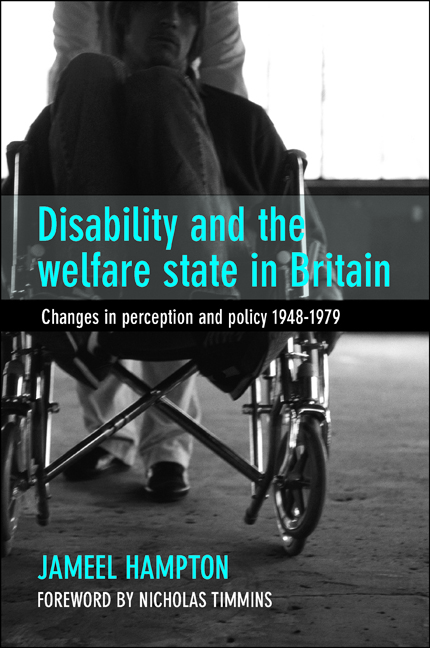Book contents
- Frontmatter
- Contents
- List of tables
- List of acronyms
- About the author
- Acknowledgements
- one Introduction
- two The old regime: provision for disabled people before the welfare state
- three Promotional welfare, 1948–63
- four The emergence of disabled people, 1964–69
- five Cinderella of the welfare state: legislation for disabled people, 1970–72
- six The final days: disability at the end of the welfare state, 1973–79
- seven The last waltz: epilogue
- eight Conclusions
- Appendix: Ministerial periods of office
- Bibliography
- Index
two - The old regime: provision for disabled people before the welfare state
Published online by Cambridge University Press: 01 September 2022
- Frontmatter
- Contents
- List of tables
- List of acronyms
- About the author
- Acknowledgements
- one Introduction
- two The old regime: provision for disabled people before the welfare state
- three Promotional welfare, 1948–63
- four The emergence of disabled people, 1964–69
- five Cinderella of the welfare state: legislation for disabled people, 1970–72
- six The final days: disability at the end of the welfare state, 1973–79
- seven The last waltz: epilogue
- eight Conclusions
- Appendix: Ministerial periods of office
- Bibliography
- Index
Summary
This chapter introduces the traditional difficulties with the welfare of disabled people through an investigation of three distinct periods in the development of statutory welfare. The first period began with the Poor Law Act 1601 (also known as the Old Poor Law) that gave local parishes responsibility for the relief of the ‘impotent’ poor. Disabled people could receive outdoor relief in cash or goods, as well as indoor relief in workhouses, hospitals or asylums, according to their particular circumstances within the mixed economy of welfare.
Attempts were constantly made to differentiate ‘undeserving’ ‘sturdy beggars’ from ‘deserving’ and genuinely disabled people. Indeed, Turner has argued for a ‘long 18th century’ of 1660 to 1830, when attitudes towards disabled people ranged from genuine compassion to revulsion to the punishment of sin and chance of salvation.
The Poor Law Amendment Act 1834 (also known as the New Poor Law), the second period, was partly a reaction to the changing needs of an increasingly urbanised and industrial economy and society in the late 18th and early 19th centuries. In opposition to the traditional practice of paternalism and the acceptability of outdoor relief, this Act focused on placing needy disabled people in institutions to ensure that their need was genuine.
In the third period, from the late 19th century, broadly, through to the Second World War, the state recognised and took on some responsibility for different groups of disabled people and their different needs and circumstances: disabled children, blind and deaf people, those with industrial injuries and ex-servicemen from the First World War. It was also in this period when central government assumed responsibility for cash benefits and pensions as part of a national social insurance system.
Disabled people in the early modern period patched together a living through the mixed economy of welfare. While the term ‘mixed economy’ only came into common use in Britain toward the end of the 20th century, Lewis has rightly pointed out that the entire history of British welfare should be viewed as ‘mixed’, not just the welfare state period and after. Finkelstein and others have argued that while early modern society was better at including disabled people in social and economic life, albeit at the very bottom, industrial evolution, urbanisation and the physical nature of industrial labour furthered their exclusion.
- Type
- Chapter
- Information
- Disability and the Welfare State in BritainChanges in Perception and Policy 1948-79, pp. 21 - 48Publisher: Bristol University PressPrint publication year: 2016



